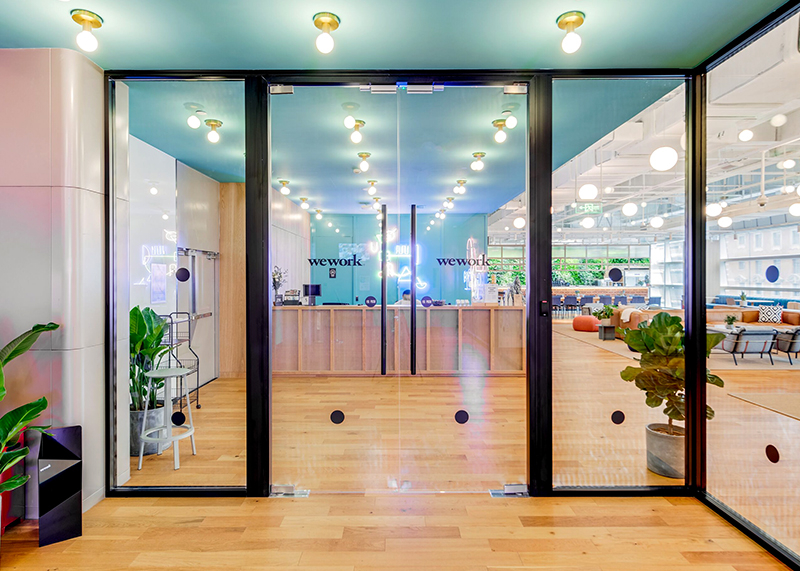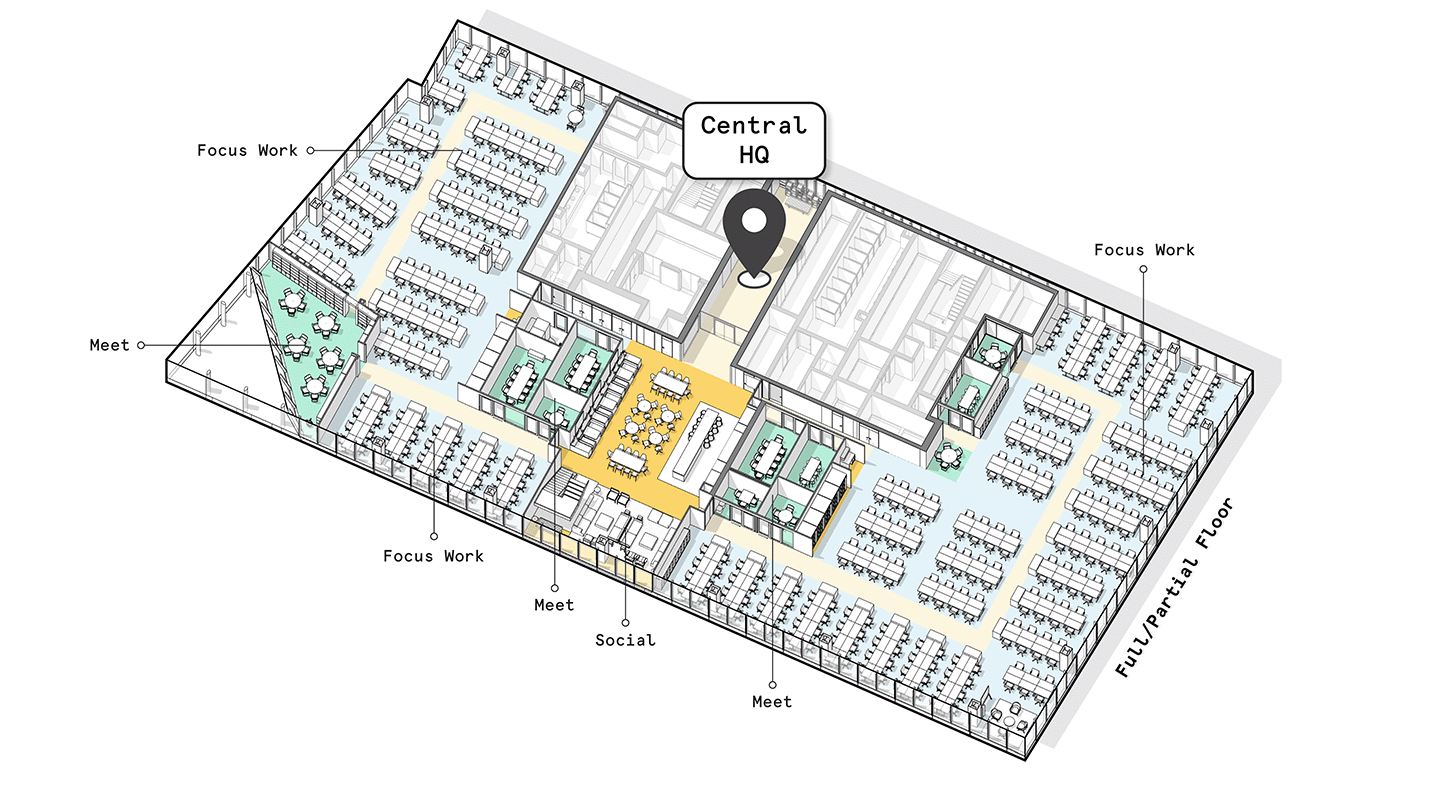A satellite office is a branch of a company that’s physically separate from the organization’s main office.
This type of workspace can be located in a different country, thousands of miles away from the primary office, or on the other side of town. A satellite office can range in size from a single desk for an individual employee to a workspace housing hundreds of workers.
Satellite offices exist to solve a number of problems, and lately their usefulness has grown to accommodate trends around flexible working. They can create convenience for a company’s remote employees, help cut down on busy commutes, and reduce the number of workers in the main office at any one time.
This type of office can also act as a base camp for expanding into and testing new markets, to provide improved customer services at a local level, or to strategically position a company to recruit the best talent from an industry hub.
No matter how they’re used, satellite offices can be an integral part of any company’s growth plans. In this article we’ll take a look at the types of businesses that use satellite offices to their advantage, as well as some of the benefits and downsides to expanding a company in this way.
Benefits of satellite offices
Lower costs
A satellite office can reduce overhead. For companies establishing a presence in a new location, a satellite office hosting a smaller local team is a cheaper alternative to moving a lot of staff around. A satellite office can also reduce staffing costs by allowing you to hire teams in areas with a lower cost of living.
Better and quicker decision-making
There’s nobody better equipped to make decisions about a local problem than a local team. A satellite office allows a decentralized company to react quickly and appropriately to emergencies and opportunities as soon as they arise, without having to seek approval or input from a head office that could be hundreds of miles away.
Take advantage of human resources from different locations
Hiring local talent has obvious benefits. You’re not only taking advantage of the knowledge and skills of people who live at the location you’re expanding into, but you open up channels to trusted local contacts, new suppliers, and other resources that might be out of reach to a team working long-distance.
Improve customer satisfaction

A 2021 survey by Intuit found that the majority (57 percent) of consumers shop local to keep money in their community, and 38 percent support local businesses to feel closer to their neighbors. Your customers feel a stronger connection to your business when they can see and speak to local teams. That could be a branch of your company in their city, or a local customer support team with real knowledge of the area. In either case, the nearer you are to your customers, the more personalized your relationships with them can be.
Offer local benefits to employees
Better perks mean happier employees, and the very best perks take advantage of and support other local businesses. A satellite office in a new spot allows you to personalize employee benefits to suit the location. That might mean a complimentary membership to a nearby gym or sports club, or a bike share program in a city that offers this commuting option.
Disadvantages of satellite offices
Lack of executive presence
As much as you might try, you can’t be everywhere at once. When you’re not physically present at a satellite office, it may be more difficult to make your voice heard and to participate effectively in the decision-making process.
Less control over the organization

For a satellite office to operate effectively and react to local conditions in an agile way, headquarters must relinquish some degree of autonomy to the teams that work there. This means that as a company grows and enters new markets, it becomes more of a challenge to control the direction of the business, and more necessary to trust your local managers to do the right thing.
Misunderstanding of the company’s work culture
A company’s culture is infamously tricky to define, but it’s derived in large part from the interactions between the people who work there. A company’s mission statement can shape the hiring and training process, but over time a satellite office can evolve its own work culture separate from the rest of the business. This can be an advantage too: A satellite office with its own local vibe can communicate more effectively with customers and partners in that location.
Lower work quality
Without adequate training, communication, and oversight, it’s possible for the quality of work to slip at a satellite office. Avoid this by keeping teams connected and collaborative no matter the distance. Ensure everyone has the technology and spaces they need to work between offices effectively. That includes everything from videoconferencing equipment and meeting rooms to fast, reliable Wi-Fi.
Types of businesses that use satellite offices
1. Growing businesses
As your teams grow and you hire more staff, there inevitably comes a point where you need more office space to fit everyone. Satellite offices are a way to expand your company’s footprint rapidly without extending your existing commercial premises, which can be disruptive and cost time and money.
2. Companies looking for new talent

Talent has a habit of congregating in one place—think of the tech industry in Silicon Valley, energy firms in Texas, or banking in New York—so companies that want to attract the best possible talent need to be visible wherever that talent happens to be. A satellite office established near a skills hub enables a growing business to attract and retain the best new hires.
3. Companies seeking commercial partnerships
Of course, it’s not only skills that congregate in one spot: Companies do too. A satellite office is a foot in the door when it comes to building commercial partnerships with other businesses working in your sector. Having a physical presence in your industry’s hub unlocks networking opportunities and expands your influence and reputation.
4. Companies that want to improve the quality of customer service
Consumers value local companies, so to improve the quality of their customer service, many businesses will establish satellite offices closer to where their customers are. A support agent or sales rep with local knowledge can build unbeatable relationships with customers and clients, helping to boost retention and satisfaction.
What should you take into account when opening a satellite office?
Location
The old adage is true when making any real estate purchasing decision, but it’s especially important when opening a satellite office. Your location should reflect the goals you have in mind for the new workplace. Will it serve employees who commute by car? Or should you strategically position your business near a talent pool?
Amenities
A truly effective satellite office can collaborate seamlessly with other offices around the company, regardless of how far away they might be. Ensure your new space has the amenities, software, tools, and infrastructure to enable teams to perform at their best.
Flexibility
A satellite office can test the waters of a new market to gain a better understanding of whether or not your business can thrive there. Market research can guide your expectations of success to a degree, but a flexible, short-term office lease can help your business navigate the unexpected. That’s true whether you decide to put the brakes on your expansion, or take your plans to the next level.
How to find a satellite office for your company
WeWork can help you establish your satellite office in cities across the world. And with WeWork All Access and WeWork On Demand, it’s easier than ever to try out different locations.
Whether you’re launching a satellite office closer to where your employees live, or setting up in a new market, WeWork’s flexible workspace solutions can help you expand into new cities quickly and without getting locked into restrictive long-term leases.

No matter how large your team, WeWork offers customizable office space that scales to meet your needs and is there when you need it. With WeWork All Access you can try out a satellite office in any one of hundreds of dedicated workspaces in WeWork locations around the world.
For last-minute flexibility, WeWork On Demand gives you access to stylishly designed workspaces and meeting rooms in dozens of cities across the United States, with no monthly commitment to worry about.
You can search, book, and pay for available office space from $29 per day with the WeWork On Demand app. To get started, download the app and create an account to begin exploring WeWork On Demand locations near you. To unlock hundreds of WeWork locations globally, visit WeWork All Access and try out one month for free.
Steve Hogarty is a writer and journalist based in London. He is the travel editor of City AM newspaper and the deputy editor of City AM Magazine, where his work focuses on technology, travel, and entertainment.
Rethinking your workspace?








